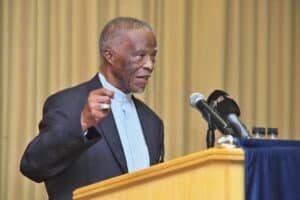Jiba said in a statement Mbeki had resuscitated the false narratives about her that had put her and her family “through hell”.

Former deputy national director of public prosecutions advocate Nomgcobo Jiba is up in arms, challenging former president Thabo Mbeki to bring evidence to back up his claim she is a counter-revolutionary.
Jiba said in a statement Mbeki had resuscitated the false narratives about her that had put her and her family “through hell”.
WATCH: Mbeki insists he can’t be blamed for NPA’s failure to prosecute apartheid era crimes
She claimed this had deeply hurt her parents after she was “persistently persecuted”, although she did not elaborate.
Jiba said Mbeki had added to the false narratives propagated against her by “white oligarchies and the media”.
Jiba ‘disappointed and hurt’
She said: “I was deeply disappointed and hurt that … president Mbeki decided to count my name as part of what he called ‘the organised counter-revolutionary’.”
Jiba was reacting to Mbeki’s address at Freedom Park in Pretoria, where he reflected on the 30th anniversary of South Africa’s democracy.
Mbeki criticised Jiba and her former deputy, Lawrence Mrwebi, quoting a report of retired Constitutional Court judge Yvonne Mokgoro, who found they were neither fit nor proper to hold office at the National Prosecuting Authority (NPA).
The court found Jiba’s conduct as NPA chief to be “inconsistent with the duty” imposed on all public officials and functionaries that they must be responsive and transparent in their duties.
It said Jiba’s stance was “technically formalistic and aimed solely at shielding the illegal and irrational decisions from judicial scrutiny”.
Mrwebi was found to have lied and abused his position, and be “unfit to practice as an advocate”.
Mbeki commented on the court findings and on an article authored by NPA head Shamila Batohi and her deputy, Anton du Plessis, in which they criticised people who “attacked from inside”, and the “stealthy and deliberate war” waged on the rule of law by the very people whose job was to protect it.
Mbeki did not directly call Jiba a counter-revolutionary, but said Batohi and Du Plessis’ article indicated “acts of counter-revolution” by those involved.
ALSO READ: WATCH: Mbeki highlights weaknesses in ANC election campaign
He said “whatever their own intentions” or the wrong things Mrwebi and Jiba did as NPA officials, it “served the purposes and objectives of counter-revolution”.
In her statement this week, Jiba appeared to have misunderstood Mbeki, or taken his statement out of context, as she attacked him and asked him to provide proof of her being a counter-revolutionary.
In a speech short of calling former president Jacob Zuma and others apartheid agents, Mbeki said the counter-revolutionary plan to change the ANC leadership began in 2002.
The ANC’s 52nd national conference held in Polokwane, Limpopo, in 2007 gave counter-revolutionaries within the party an opportunity to implement their plan, he said.
This implied Zuma’s victory over Mbeki at Polokwane and Mbeki’s subsequent recall as president were part of a plot by the apartheid regime, using their agents to infiltrate the ANC.
‘Apartheid agents elusive’
Mbeki said the ANC did its best to uncover the apartheid agents but many of them remained undetected.
Political analyst Sandile Swana, said counter-revolution did not apply in the case of Zuma and his alleged criminal shenanigans.
He said Zuma and his supporters went to Polokwane, knowing they would return and target the law enforcement agencies and the prosecuting body and eliminate them.
“But some of Zuma’s then backers, such as Julius Malema and Zwelinzima Vavi, might not have been aware Zuma had no agenda of the working class but his own personal agenda.
“This is not counter-revolution but a criminal programme [which] had flourished under Zuma – those who wanted things to go in a straight line had to be eliminated,” Swana said.
“The undermining of the constitution is not counter-revolution but is a criminal cover-up. When people do not want to investigate or prosecute crime, that is not counter-revolution but crime in itself, this is criminal programme”.
ALSO READ: ‘White people didn’t steal the land… black people must accept defeat’ – Moeletsi Mbeki
Mbeki also took a swipe at Zuma and former SA Revenue Service (Sars) national commissioner Tom Moyane for participation in attempts to render Sars ineffective.
He said as the Commission of Inquiry into Tax Administration and Governance at Sars reported, some people set out to destroy the revenue service and fingered Zuma and Moyane.
“Obviously the destruction of Sars would mean the destruction of the democratic state, given its task in the provision of revenues,” Mbeki said.
He described Zuma as a wolf in sheep-skin.
“In terms of this, it’s the only way to explain it. Accordingly, in terms of this logic, such a wolf, so to speak, in an effort to destroy Sars, would not be surprising as it would represent the discharge of its responsibilities as part of the counter-revolution,” Mbeki said.






